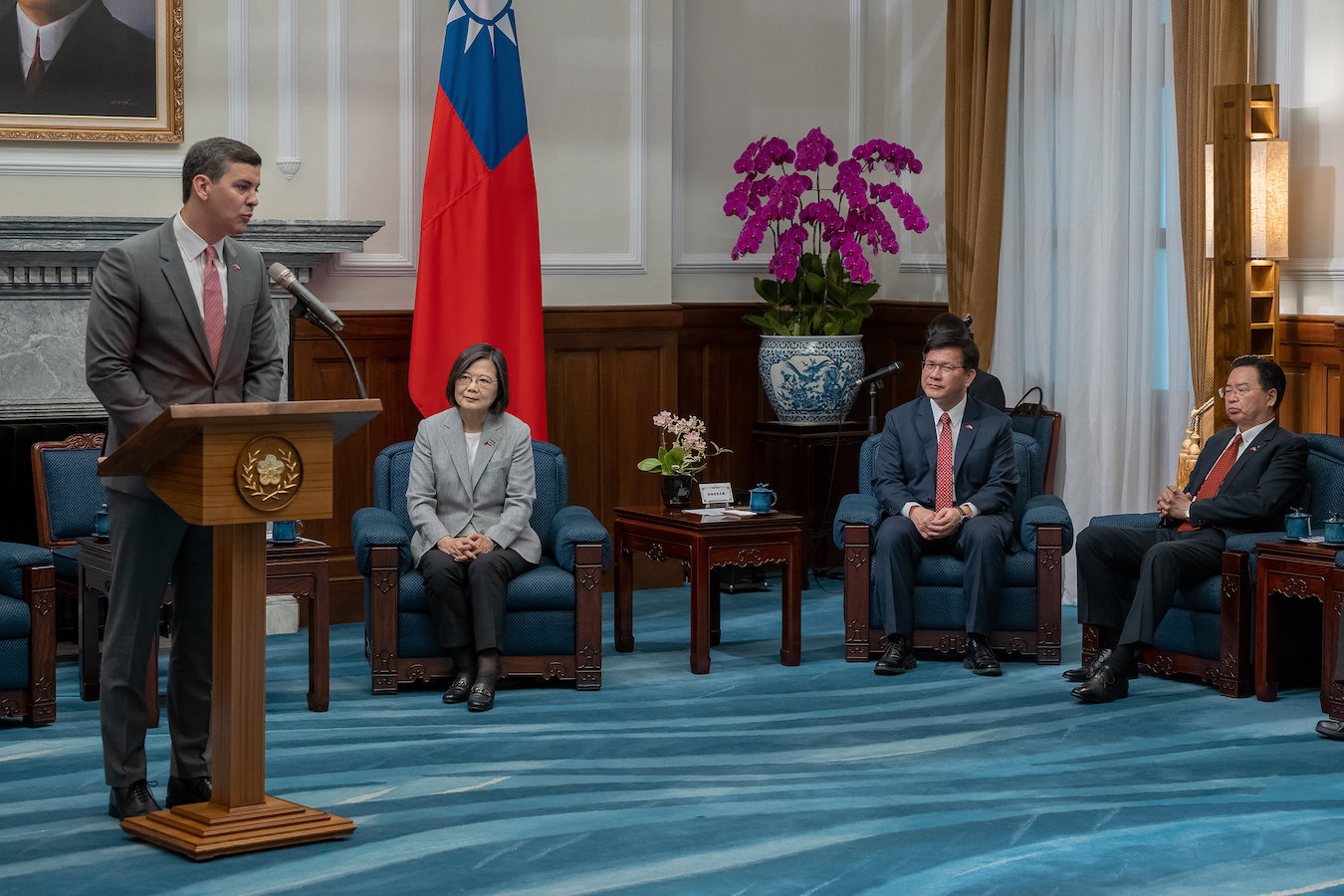by Brian Hioe
語言:
English
Photo Credit: Tsai Ing-wen/Facebook
A RECENT VISIT to Taiwan by Paraguayan president-elect Salvador Peña should serve as a reminder of Taiwan’s ties with regimes with questionable human rights records. Namely, even as Peña is feted as an ally of Taiwan, the Colorado Party that he served as the candidate of has ruled over Paraguay in an autocratic fashion for 75 years–if anything, the Colorado Party reminds of the KMT during its many decades of authoritarian rule in Taiwan.
In particular, before Peña’s electron victory, it was speculated that Paraguay could potentially switch recognition to China if the opposition Authentic Radical Liberal Party were to win. Opposition candidate Efraín Alegre stated that he intended to do so if he were to win.
 Taiwanese president Tsai Ing-wen (second from left) meeting with Paraguayan president-elect Salvador Peña (far left). Photo credit: Makoto Lin/Presidential Office/CC BY 2.0
Taiwanese president Tsai Ing-wen (second from left) meeting with Paraguayan president-elect Salvador Peña (far left). Photo credit: Makoto Lin/Presidential Office/CC BY 2.0
This is not the first time that an opposition candidate in a Latin American country has vowed to switch diplomatic recognition to China if they win. Previously, Xiomara Castro promised this ahead of the Honduran elections. Castro backed away from this promise once she won, perhaps hoping to avoid provoking the US by breaking ties with Taiwan immediately after taking office. Nevertheless, Castro eventually acted on this promise after a little over one year in office. Opposition candidates have sometimes framed the issue as that their countries stand to miss out on historic opportunities if their access to the Chinese market is limited by their diplomatic ties with Taiwan, which is, of course, significantly smaller than China.
Nevertheless, Alegre was defeated in the elections. This is not entirely surprising–the only time in 75 years that the Colorado Party has not held power in Paraguay was for a brief five years between 2008 and 2013. The Colorado Party previously ruled over Paraguay by way of a military dictatorship. Even in the present, activists still face targeting by the government, and basic freedoms of expression and assembly are cracked down on by the government. Indigenous groups and members of the LGBTQIA community are among those most targeted by the government and police, which itself has a reputation for corruption.
Taiwan is larger than all of its diplomatic allies, whether this is measured in terms of size of population or economy–Paraguay’s GDP is only around 15% of Taiwan’s and it has a population of 6.704 million compared to Taiwan’s 23 million. Taiwan has long been accused of engaging in “dollar diplomacy”–backing authoritarian regimes in return for diplomatic recognition, subsidizing infrastructure projects, or throwing slush funds paid to politicians. The role that such countries play is that they can speak up for Taiwan in international organizations that Taiwan is itself denied access to, but this increasingly seems less significant at a time of strengthened informal relations between Taiwan and Western powers such as the US.
Yet Taiwan’s financial heft is not insubstantial. Aid funding from Taiwan to Paraguay is around 1% of Paraguay’s GDP. Reports previously suggested that Peña’s predecessor Mario Abdo Benitez requested 1 billion USD in aid from Taiwan in return for recognition.
Peña has pledged to maintain ties with Taiwan during his five years in office while suggesting that it would be a mistake for Paraguay to switch ties to China. Many of the diplomatic events that he has attended in Taiwan during his visit have involved food, though in the past under Abdo, diplomatic visits by Paraguayan presidents touted beef imports and other industries. The visit is framed as celebrating 66 years of ties between fellow democracies, never mind that Paraguay’s claims to be a democracy are somewhat suspect.
 Photo credit: Tsai Ing-wen/Facebook
Photo credit: Tsai Ing-wen/Facebook
Peña visiting Taiwan before taking office is likely to reassure of ties, then. This, too, has become a pattern in which outgoing presidents of diplomatic allies of Taiwan visit Taiwan before an election to try and shore up ties as part of campaigning, or in which president-elects visit Taiwan to reassure ties before taking office. At the same time, some experts have suggested that Taiwan keep an eye as to shifts in Paraguayan politics if traditional loyalties might eventually shift.
The importance of Paraguay, as one of Taiwan’s few remaining diplomatic allies, is highlighted by that vice president William Lai–the DPP’s presidential candidate for 2024 elections–will be where Lai visits as part of stopovers to the US next month. But perhaps Taiwan could stand to be more attentive to that claimed allies in Paraguay may, in fact, be far from democratic.

